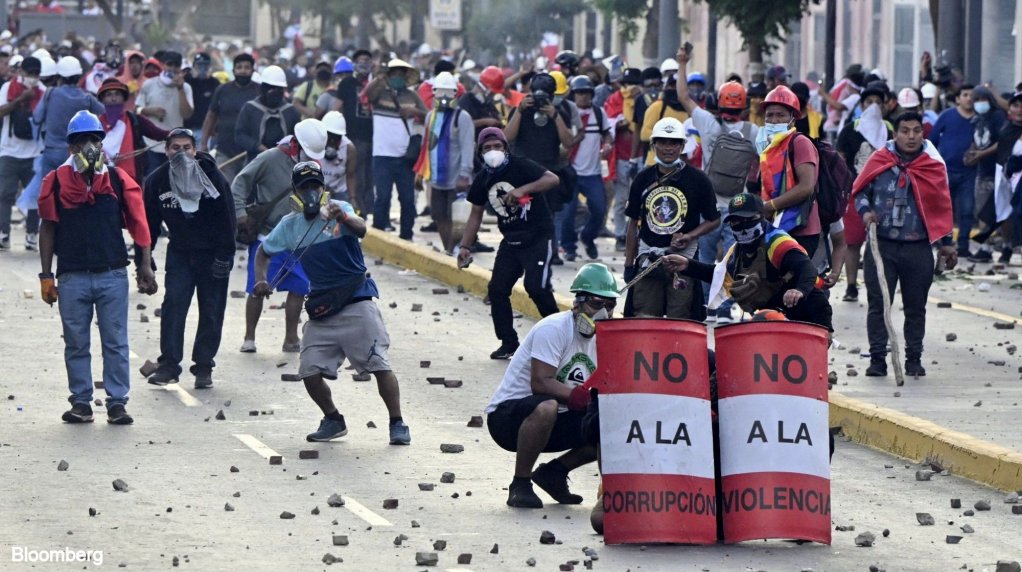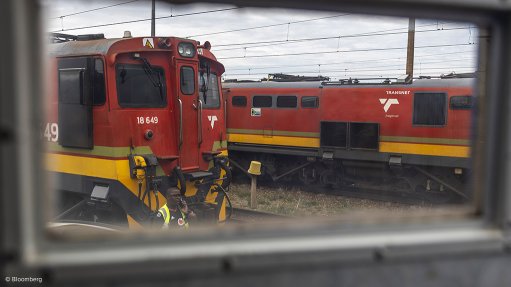Peru’s violent protests imperil 30% of its copper output
An upsurge in the violent protests wracking Peru is crimping copper output in the world’s No. 2 supplier, with about 30% of its production at risk at a time of low global stocks and high prices.
One copper mine is offline after demonstrators stormed the site, another has seen shipments choked by roadblocks, while others have slowed operations as a precaution to manage scarce supplies of fuel and other inputs, according to industry group SNMPE.
“The situation of protests and the escalation of violence have affected the industry,” Magaly Bardales, who heads a mining sector committee at the association, said in a telephone interview. “We hope an understanding, a dialog with authorities, can be found to provide a swift solution.”
Demonstrators have blocked roads across Peru and clashed with security forces in more than six weeks of violent turmoil that began when President Pedro Castillo was impeached after he attempted to dissolve congress. Protesters are calling for both interim President Dina Boluarte and congress to be replaced, with more than 50 deaths and the violence showing no signs of easing.
The disruption coincides with operational setbacks and regulatory headwinds in neighboring Chile and the prospect of a mine shutdown in Panama as the government there seeks a bigger share of profit. Those supply threats have combined with optimism over Chinese demand after the lifting of Covid restrictions to send copper futures to seven-month highs.
With global stockpiles of the wiring metal at historically low levels, traders are keeping close watch on events in Peru. The Andean nation accounts for about a 10th of global copper supply and is a major exporter of zinc and silver. About $160 million of production has been lost in 23 days of protests, Bardales said.
To be sure, protests are nothing new in Peru. It’s emergence as a major mineral producer has exacerbated historically tense relations with poor rural communities. The mining industry says not enough of the record-high revenue it generates for the state goes to improving local infrastructure and services.
But the current wave of unrest stands out from past events.
“I haven’t seen this level of violence, the coordinated nature of action, seeking to affect mining and energy, during the time I have been working in the sector,” Bardales said.
Much of the unrest is centered in the southern region of Puno, where Minsur’s San Rafael tin mine has been targeted. About 1 500 workers at San Rafael still can’t be evacuated, she said.
Tensions have fanned out into other areas of the south including Espinar, Arequipa and Cusco. Glencore's Antapaccay mine has halted operations after protesters entered and damaged a worker camp.
The Las Bambas complex is mining at a reduced rate due to blockade-related supply challenges, its Chinese-owned operator MMG Ltd. said, without elaborating. Bardales said Las Bambas is operating at just 20% of capacity, even as it continues to process ore on site.
The Cerro Verde mine in Arequipa isn’t being directly affected by protests but it has slowed mill operations by 10% to15% in the past several days in a bid to conserve supplies such as lime amid a “very complicated” political situation, operator Freeport-McMoRan said this week on an earnings call.
Other mines to the north, such as BHP Group-Glencore’s Antamina are running normally, as are mines in the south that don’t depend on the so-called mining corridor for the transport of supplies, copper and people.
While the transport of semi-processed copper to ports has seen some disruption, the ports themselves are operating normally, Bardales said. She hadn’t heard of any “relevant” impacts on shipments.
The mining society continues to project an increase in Peruvian copper production this year as a new mine ramps up, although much depends on how long the current spate of protests lasts.
The unrest also jeopardizes the rollout of $53.7-billion in possible investments at a time when the world needs to accelerate decarbonization and boost minerals required for electromobility, according to BTG Pactual analyst Cesar Perez-Novoa.
“The combination of instability in other jurisdictions may exert upward pressure on copper prices,” Perez-Novoa said.
Comments
Press Office
Announcements
What's On
Subscribe to improve your user experience...
Option 1 (equivalent of R125 a month):
Receive a weekly copy of Creamer Media's Engineering News & Mining Weekly magazine
(print copy for those in South Africa and e-magazine for those outside of South Africa)
Receive daily email newsletters
Access to full search results
Access archive of magazine back copies
Access to Projects in Progress
Access to ONE Research Report of your choice in PDF format
Option 2 (equivalent of R375 a month):
All benefits from Option 1
PLUS
Access to Creamer Media's Research Channel Africa for ALL Research Reports, in PDF format, on various industrial and mining sectors
including Electricity; Water; Energy Transition; Hydrogen; Roads, Rail and Ports; Coal; Gold; Platinum; Battery Metals; etc.
Already a subscriber?
Forgotten your password?
Receive weekly copy of Creamer Media's Engineering News & Mining Weekly magazine (print copy for those in South Africa and e-magazine for those outside of South Africa)
➕
Recieve daily email newsletters
➕
Access to full search results
➕
Access archive of magazine back copies
➕
Access to Projects in Progress
➕
Access to ONE Research Report of your choice in PDF format
RESEARCH CHANNEL AFRICA
R4500 (equivalent of R375 a month)
SUBSCRIBEAll benefits from Option 1
➕
Access to Creamer Media's Research Channel Africa for ALL Research Reports on various industrial and mining sectors, in PDF format, including on:
Electricity
➕
Water
➕
Energy Transition
➕
Hydrogen
➕
Roads, Rail and Ports
➕
Coal
➕
Gold
➕
Platinum
➕
Battery Metals
➕
etc.
Receive all benefits from Option 1 or Option 2 delivered to numerous people at your company
➕
Multiple User names and Passwords for simultaneous log-ins
➕
Intranet integration access to all in your organisation



















